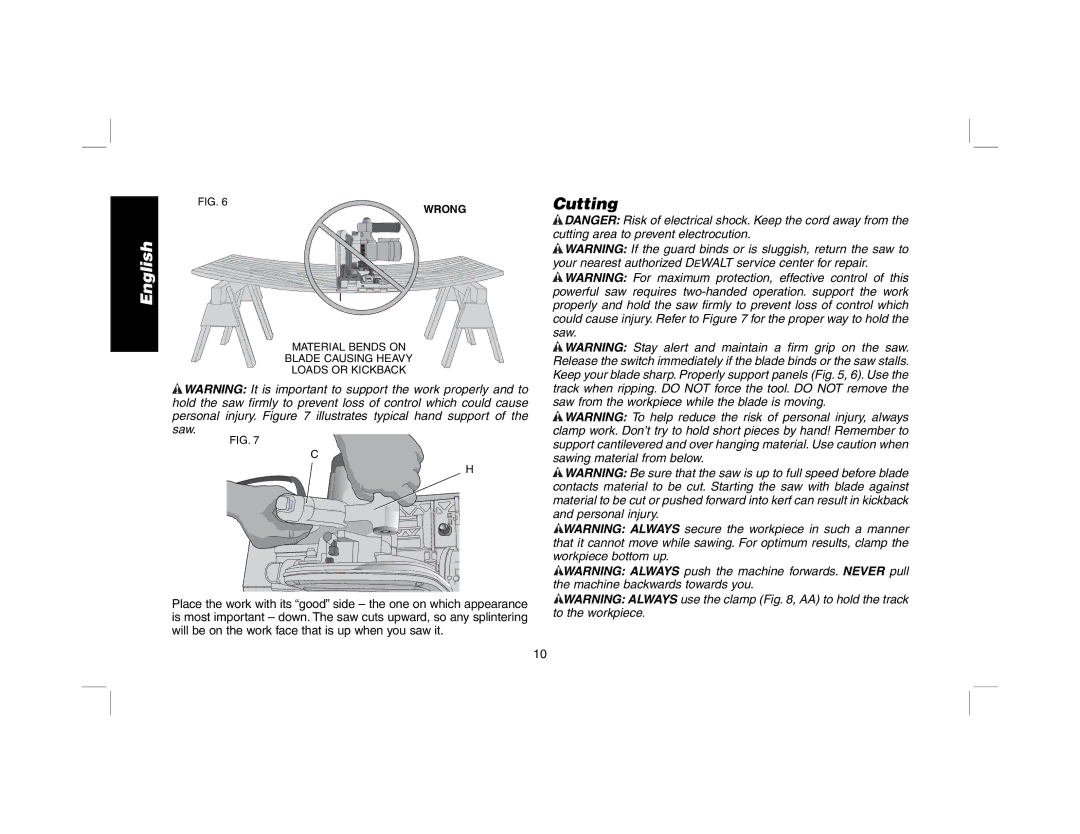
English
FIG. 6
WRONG
MATERIAL BENDS ON
BLADE CAUSING HEAVY
LOADS OR KICKBACK
![]() WARNING: It is important to support the work properly and to hold the saw firmly to prevent loss of control which could cause personal injury. Figure 7 illustrates typical hand support of the saw.
WARNING: It is important to support the work properly and to hold the saw firmly to prevent loss of control which could cause personal injury. Figure 7 illustrates typical hand support of the saw.
FIG. 7
C
H
Place the work with its “good” side – the one on which appearance is most important – down. The saw cuts upward, so any splintering will be on the work face that is up when you saw it.
Cutting
![]() DANGER: Risk of electrical shock. Keep the cord away from the cutting area to prevent electrocution.
DANGER: Risk of electrical shock. Keep the cord away from the cutting area to prevent electrocution.
![]() WARNING: If the guard binds or is sluggish, return the saw to your nearest authorized DEWALT service center for repair.
WARNING: If the guard binds or is sluggish, return the saw to your nearest authorized DEWALT service center for repair.
![]() WARNING: For maximum protection, effective control of this powerful saw requires
WARNING: For maximum protection, effective control of this powerful saw requires
![]() WARNING: Stay alert and maintain a firm grip on the saw. Release the switch immediately if the blade binds or the saw stalls. Keep your blade sharp. Properly support panels (Fig. 5, 6). Use the track when ripping. DO NOT force the tool. DO NOT remove the saw from the workpiece while the blade is moving.
WARNING: Stay alert and maintain a firm grip on the saw. Release the switch immediately if the blade binds or the saw stalls. Keep your blade sharp. Properly support panels (Fig. 5, 6). Use the track when ripping. DO NOT force the tool. DO NOT remove the saw from the workpiece while the blade is moving.
![]() WARNING: To help reduce the risk of personal injury, always clamp work. Don’t try to hold short pieces by hand! Remember to support cantilevered and over hanging material. Use caution when sawing material from below.
WARNING: To help reduce the risk of personal injury, always clamp work. Don’t try to hold short pieces by hand! Remember to support cantilevered and over hanging material. Use caution when sawing material from below.
![]() WARNING: Be sure that the saw is up to full speed before blade contacts material to be cut. Starting the saw with blade against material to be cut or pushed forward into kerf can result in kickback and personal injury.
WARNING: Be sure that the saw is up to full speed before blade contacts material to be cut. Starting the saw with blade against material to be cut or pushed forward into kerf can result in kickback and personal injury.
![]() WARNING: ALWAYS secure the workpiece in such a manner that it cannot move while sawing. For optimum results, clamp the workpiece bottom up.
WARNING: ALWAYS secure the workpiece in such a manner that it cannot move while sawing. For optimum results, clamp the workpiece bottom up.
![]() WARNING: ALWAYS push the machine forwards. NEVER pull the machine backwards towards you.
WARNING: ALWAYS push the machine forwards. NEVER pull the machine backwards towards you.
![]() WARNING: ALWAYS use the clamp (Fig. 8, AA) to hold the track to the workpiece.
WARNING: ALWAYS use the clamp (Fig. 8, AA) to hold the track to the workpiece.
10
